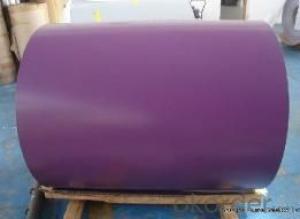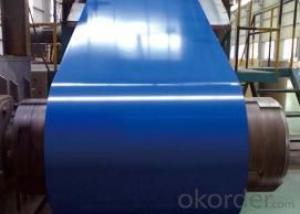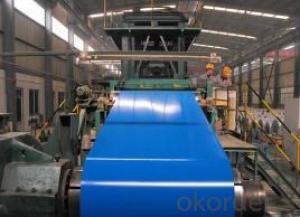Color Coated Alu-zinc Steel Coil PPGP for building
- Loading Port:
- Shanghai
- Payment Terms:
- TT OR LC
- Min Order Qty:
- 20 m.t.
- Supply Capability:
- 10000 m.t./month
OKorder Service Pledge
OKorder Financial Service
You Might Also Like
| Standard: | AISI,ASTM,BS,DIN,GB,JIS | Grade: | SGCC,SGCD1,SGCD2.SGCD3,SGC340, | Thickness: | 0.17-2.0mm |
| Place of Origin: | China (Mainland) | Brand Name: | Model Number: | SGCC,SGCD1,SGCD2.SGCD3,SGC340, | |
| Type: | Steel Coil | Technique: | Cold Rolled | Surface Treatment: | Coated |
| Application: | widely | Special Use: | High-strength Steel Plate | Width: | 600-1250mm |
| Length: | coil |
Packaging & Delivery
| Packaging Detail: | standard sea-worthy packaging or as buyers' requirement. |
| Delivery Detail: | Within 20-30 days after we receive depoist or L/C at sight |
color coated steel coil
Product Description
Company | CNBM |
Product | color coated steel coil |
Port | Shang Hai China |
Thickness | 0.17-2.0mm |
Width | 600-1250mm |
Material Grade | SGCC,SGCH,SGCD1-SGCD3,DX51D |
Technique | cold rolled |
Standard | ASTM,GB ,AISI,JIS,EN |
Test | With Hydraulic Testing, Eddy Current , Infrared Test |
Application | Widely used for roofs, outer walls, ovens, explosive-proof steel, electrically controlled cabinets,galvanized tube/pipe, ceiling channel, building material |
Surface | coated |
Package | standard sea-worthy packaging or as buyers' requirement. |
MOQ | 20 tons |
Payment | L/C,T/T |
Delivery time | According to The Specifications And the Quantities,Time Begin When We confirm the Date of the Earnest or L/C. |
- Q:Where can you buy a steel polearm in a shop or if someone has a file in Scania than can you sell me one ill buy it for 150k my account is tonypark500
- you can buy it at the free market, but they worth more than 150k they sell for about 1m so good luck with getting polearm.
- Q:What are the different types of welding used for steel coils?
- Steel coil fabrication involves the utilization of various welding techniques, each catered to specific requirements and applications. Here, we present some commonly employed welding methods for steel coil fabrication: 1. Stick welding, also known as Shielded Metal Arc Welding (SMAW), utilizes a flux-coated electrode and an electric current to generate an arc between the electrode and the base material. SMAW is a versatile and extensively used technique suitable for a range of steel coil applications. 2. Gas Metal Arc Welding (GMAW), also referred to as MIG (Metal Inert Gas) welding, employs a continuous wire electrode and a shielding gas to safeguard the weld pool against atmospheric contamination. GMAW is renowned for its high welding speed and ease of automation, making it a favored choice for steel coil manufacturing. 3. Flux-Cored Arc Welding (FCAW) shares similarities with GMAW, but employs a tubular electrode with flux inside. The flux serves as both the shielding gas and added alloying elements, resulting in enhanced efficiency and weld quality. FCAW is often employed for high-speed welding applications in steel coil fabrication. 4. Gas Tungsten Arc Welding (GTAW), also known as TIG (Tungsten Inert Gas) welding, employs a non-consumable tungsten electrode and an inert gas, typically argon, to protect the weld area. GTAW delivers high-quality, precise welds with exceptional control over heat input, rendering it suitable for thin steel coil materials and critical welding scenarios. 5. Submerged Arc Welding (SAW) involves the use of a continuously fed wire electrode and a granular flux that covers the weld area. The arc is submerged beneath the flux, providing excellent protection and minimizing the need for post-weld cleaning. SAW is commonly employed for welding thick steel coils due to its high deposition rates and deep penetration capabilities. These examples highlight the diverse range of welding techniques employed in steel coil fabrication. The selection of the appropriate welding method depends on factors such as the specific steel grade, thickness, desired weld quality, production speed, and cost considerations. It is crucial to choose the suitable welding technique to ensure the longevity and performance of steel coils across different applications.
- Q:I have heard using the BRASS casing is the best thing for an AR-15? Should i just use Brass or Steel?
- Unfortunately, steel case ammo being actually harmful for your AR is a quite popular myth. Steel is less malleable than brass. When you fire a brass cartridge, the brass expands to the chamber walls and helps block any expanding cases from dirtying up your chamber. When firing steel cartridges, the steel doesn't expand as well as brass, so you probably will end up getting a little carbon residue in the chamber. This tiny amount of carbon in the chamber is enough to make extraction of brass cased ammo more difficult. When the brass expands to the dirty chamber after firing steel ammo, it conforms to the carbon residue somewhat, increasing friction. This small amount of friction is sometimes enough to make a normally okay AR malfunction when attempting to eject a fired cartridge. So to give you a short answer, use both! Just make sure to really clean out the chamber after firing steel ammo.
- Q:How are steel coils used in the production of shipping vessels?
- Steel coils are an essential component in the production of shipping vessels. These coils are typically made from high-strength steel, which makes them ideal for constructing the hulls and other structural components of the ships. In the shipbuilding process, the steel coils are first unrolled and cut into specific sizes and shapes according to the ship's design. These pre-cut pieces are then welded or bolted together to form the framework of the vessel. This framework provides the necessary strength and rigidity to withstand the harsh conditions of the sea. Steel coils are also used to manufacture the decks, bulkheads, and other interior components of the shipping vessels. These coils are molded and shaped into various sections that are then assembled and attached to the ship's structure. The use of steel coils in these areas ensures durability and resistance to corrosion, which is crucial for the longevity and safety of the vessel. Furthermore, steel coils are used in the production of ship propellers, rudders, and steering mechanisms. These components are crucial for controlling the direction and movement of the ship. The high-strength steel coils provide the necessary strength and reliability to ensure smooth and efficient navigation. Overall, steel coils play a vital role in the production of shipping vessels by providing strength, durability, and resistance to corrosion. They are used in various parts of the ship's construction, including the hull, decks, bulkheads, and interior components. Without steel coils, the production of shipping vessels would be challenging, and the resulting ships would lack the necessary structural integrity to navigate the seas safely and efficiently.
- Q:How do steel coils perform in corrosive environments?
- Steel coils exhibit excellent performance in corrosive environments due to their inherent resistance to corrosion. This is primarily because steel, being composed of iron and various elements like carbon, produces a protective layer called a passive film. This passive film acts as a barrier between the steel surface and corrosive elements, effectively preventing direct contact and minimizing the risk of corrosion. Moreover, steel coils can be coated with different protective coatings to enhance their corrosion resistance. Coatings like zinc or epoxy provide an additional layer of protection, significantly prolonging the lifespan of steel coils in corrosive environments. However, it is important to acknowledge that the performance of steel coils in corrosive environments can still be influenced by factors such as the type of corrosive agent, duration of exposure, and presence of other contaminants. In highly aggressive environments, such as those with high humidity, exposure to saltwater, or acidic chemicals, the protective layers on steel coils might deteriorate over time, thereby increasing the potential for corrosion. To ensure optimal performance in corrosive environments, it is advisable to choose steel coils with corrosion-resistant properties, such as stainless steel or galvanized steel. Regular maintenance and inspections are also crucial to promptly detect any signs of corrosion and implement appropriate measures to prevent further damage. In conclusion, steel coils generally exhibit good resistance to corrosion in most environments, but the severity of the corrosive conditions can ultimately impact their performance.
- Q:What are the common tests performed on steel coils?
- The common tests performed on steel coils include dimensional inspection, visual inspection, chemical composition analysis, mechanical testing (such as tensile and hardness tests), coating thickness measurement, and surface quality assessment.
- Q:How are steel coils used in the production of industrial machinery?
- Steel coils are used in the production of industrial machinery as they provide a strong and durable material for various components. These coils are often shaped and cut to specific sizes to create parts such as gears, shafts, and frames, which are essential for the functioning of machinery. The high strength and flexibility of steel coils make them ideal for withstanding heavy loads and harsh operating conditions, ensuring the reliability and longevity of industrial machinery.
- Q:I want to start getting throwing knives and i was wondering what material is best for quality, but still cheap. I also saw some 440 stainless steel knives that i liked and wanted to know if the material was good
- For throwing knives, 440 isn’t necessarily a bad choice. Does it list whether it is 440c or 440b? That matters somewhat. The advantages of 440 Stainless is that it’s relatively hard (for a stainless), it resists rust significantly, and it’s not so hard that it would shatter or break. On the down side 440 is notorious for not taking or holding an edge, but for a throwing knife, that’s probably not much of an issue. If you’re looking for something to train with, you’re fine here. It’s plenty of steel enough to stick in wood or other targets. Odds are it won't bend if you slam it into some wood. If it lands on concrete, eh, it's going to scratch and all that jazz, and it might hurt the tip if it hits first, but as has been said, you can use a file or grinder to get the tip back.
- Q:How are steel coils processed and shaped into various products?
- Steel coils are processed and shaped into various products through a series of manufacturing processes. First, the steel coil is uncoiled and cleaned to remove any impurities. Then, it goes through a process called leveling, where the coil is flattened and straightened. Next, the steel is cut into the desired length or shape, using techniques like shearing or slitting. After that, it may undergo additional processes such as forming, bending, or rolling to give it the desired shape. Finally, the steel is often treated with coatings or finishes to enhance its durability and appearance.
- Q:How are steel coils used in the manufacturing of cables?
- Steel coils are used in the manufacturing of cables as they provide strength and support to the cable structure. The steel coils are typically used as armor or reinforcement, helping to protect the cables from external elements and maintain their structural integrity.
1. Manufacturer Overview |
|
|---|---|
| Location | |
| Year Established | |
| Annual Output Value | |
| Main Markets | |
| Company Certifications | |
2. Manufacturer Certificates |
|
|---|---|
| a) Certification Name | |
| Range | |
| Reference | |
| Validity Period | |
3. Manufacturer Capability |
|
|---|---|
| a)Trade Capacity | |
| Nearest Port | |
| Export Percentage | |
| No.of Employees in Trade Department | |
| Language Spoken: | |
| b)Factory Information | |
| Factory Size: | |
| No. of Production Lines | |
| Contract Manufacturing | |
| Product Price Range | |
Send your message to us
Color Coated Alu-zinc Steel Coil PPGP for building
- Loading Port:
- Shanghai
- Payment Terms:
- TT OR LC
- Min Order Qty:
- 20 m.t.
- Supply Capability:
- 10000 m.t./month
OKorder Service Pledge
OKorder Financial Service
Similar products
New products
Hot products
Related keywords





























